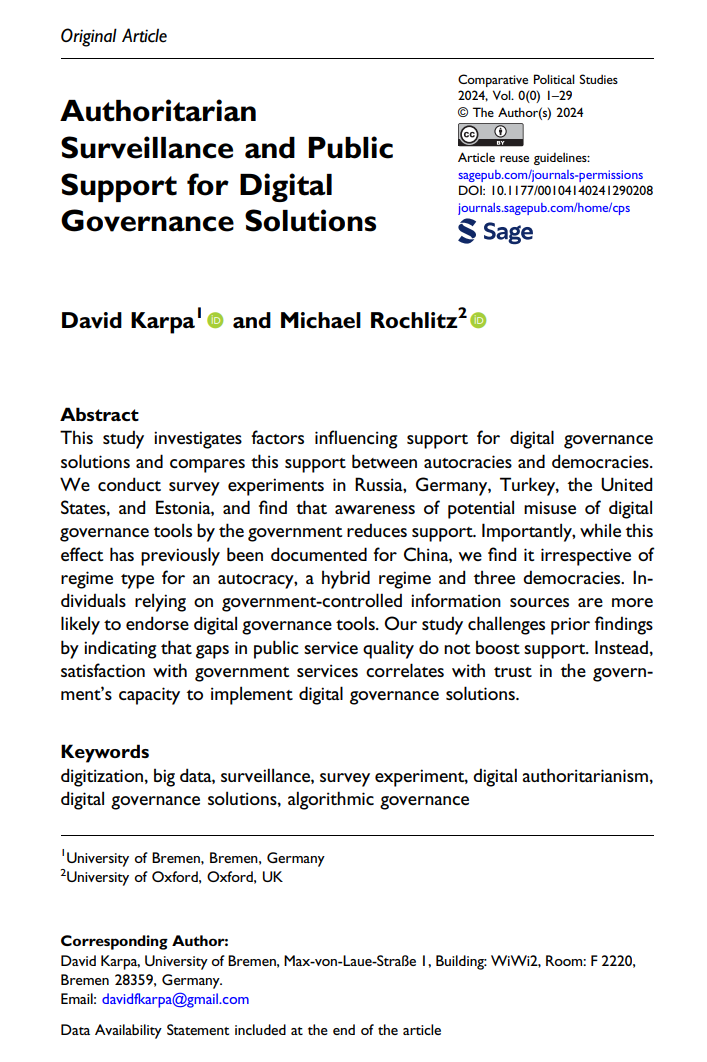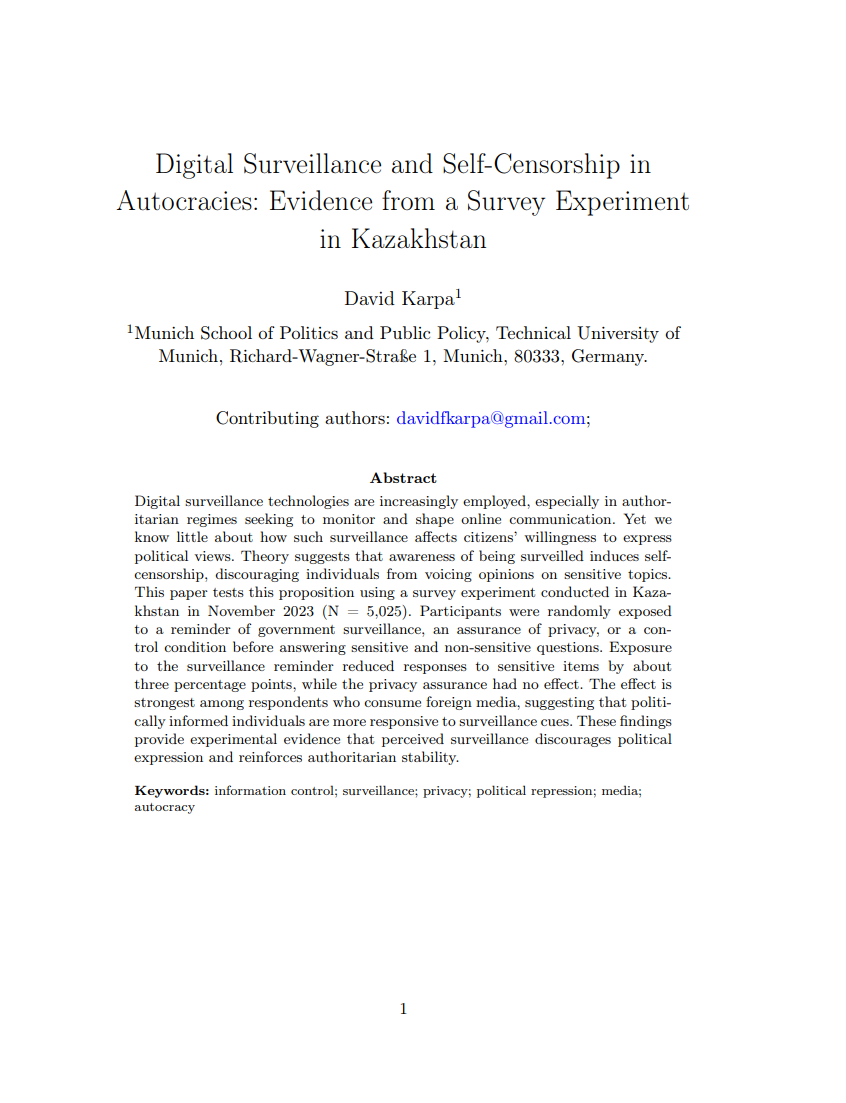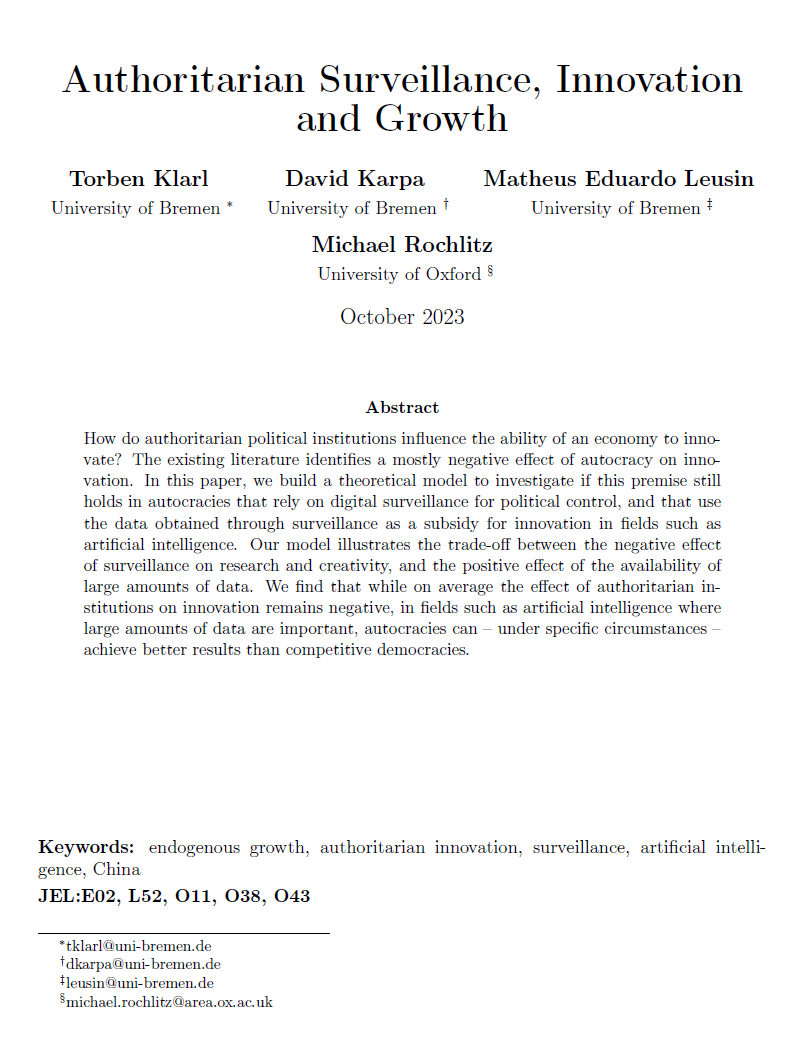publications
Publications.
2025
-
 Authoritarian surveillance and public support for digital governance solutionsDavid Karpa and Michael RochlitzComparative Political Studies, 2025
Authoritarian surveillance and public support for digital governance solutionsDavid Karpa and Michael RochlitzComparative Political Studies, 2025This study investigates factors influencing support for digital governance solutions and compares this support between autocracies and democracies. We conduct survey experiments in Russia, Germany, Turkey, the United States, and Estonia, and find that awareness of potential misuse of digital governance tools by the government reduces support. Importantly, while this effect has previously been documented for China, we find it irrespective of regime type for an autocracy, a hybrid regime and three democracies. Individuals relying on government-controlled information sources are more likely to endorse digital governance tools. Our study challenges prior findings by indicating that gaps in public service quality do not boost support. Instead, satisfaction with government services correlates with trust in the government’s capacity to implement digital governance solutions.
@article{karpa2025authoritarian, title = {Authoritarian surveillance and public support for digital governance solutions}, author = {Karpa, David and Rochlitz, Michael}, journal = {Comparative Political Studies}, volume = {58}, number = {10}, pages = {2237--2265}, year = {2025}, publisher = {SAGE Publications}, } -
 Digital Surveillance and Self-Censorship in Autocracies: Evidence from a Survey Experiment in KazakhstanDavid KarpaWorking Paper, 2025
Digital Surveillance and Self-Censorship in Autocracies: Evidence from a Survey Experiment in KazakhstanDavid KarpaWorking Paper, 2025Digital surveillance technologies are increasingly employed, especially in authoritarian regimes seeking to monitor and shape online communication. Yet we know little about how such surveillance affects citizens’ willingness to express political views. Theory suggests that awareness of being surveilled induces selfcensorship, discouraging individuals from voicing opinions on sensitive topics. This paper tests this proposition using a survey experiment conducted in Kazakhstan in November 2023 (N = 5,025). Participants were randomly exposed to a reminder of government surveillance, an assurance of privacy, or a control condition before answering sensitive and non-sensitive questions. Exposure to the surveillance reminder reduced responses to sensitive items by about three percentage points, while the privacy assurance had no effect. The effect is strongest among respondents who consume foreign media, suggesting that politically informed individuals are more responsive to surveillance cues. These findings provide experimental evidence that perceived surveillance discourages political expression and reinforces authoritarian stability.
@article{karpa2025selfcensorship, title = {Digital Surveillance and Self-Censorship in Autocracies: Evidence from a Survey Experiment in Kazakhstan}, author = {Karpa, David}, journal = {Working Paper}, year = {2025}, } -
 Language Affinity, Russian Media and Sanctions EvasionAndrey Tkachenko, David Karpa, Michael Rochlitz, and 2 more authors2025Available at SSRN: https://ssrn.com/abstract=5604802
Language Affinity, Russian Media and Sanctions EvasionAndrey Tkachenko, David Karpa, Michael Rochlitz, and 2 more authors2025Available at SSRN: https://ssrn.com/abstract=5604802Does language affinity with a former colonizing power make countries vulnerable to outside influence? By combining multiple survey waves, online search statistics, a survey experiment, and international trade data, we study this question for Kazakhstan. We show a shift towards pro-Russian opinions among the Russian-speaking population after Russia’s full-scale invasion of Ukraine, even among ethnically Kazakh citizens. We relate this shift in opinion to a substantial increase in Russian online news and social media consumption after February 2022. We demonstrate that the consumption of Russian propaganda increases the justification for circumventing sanctions against Russia. Finally, using detailed trade data, we document that re-exports of sanctioned products to Russia increased disproportionately after February 2022 from regions where the population is more exposed to Russian propaganda. Our results shed light on how former colonial powers influence beliefs and economic behavior in their former colonies during wartime.
@article{tkachenko2025language, title = {Language Affinity, Russian Media and Sanctions Evasion}, author = {Tkachenko, Andrey and Karpa, David and Rochlitz, Michael and Tatkeyeva, Meruyert and Sagyndykova, Galiya}, year = {2025}, journal = {Working Paper}, type = {Working Paper}, url = {https://ssrn.com/abstract=5604802}, doi = {10.2139/ssrn.5604802}, keywords = {Media, Language, Sanctions, Evasion, Kazakhstan, Russia-Ukraine War}, language = {English}, note = {Available at SSRN: https://ssrn.com/abstract=5604802}, }
2023
-
 Authoritarian Surveillance, Innovation and GrowthTorben Klarl, David Karpa, Matheus Eduardo Leusin, and 1 more authorSSRN, 2023Available at SSRN: https://ssrn.com/abstract=4594849
Authoritarian Surveillance, Innovation and GrowthTorben Klarl, David Karpa, Matheus Eduardo Leusin, and 1 more authorSSRN, 2023Available at SSRN: https://ssrn.com/abstract=4594849@article{klarl2023authoritarian, title = {Authoritarian Surveillance, Innovation and Growth}, author = {Klarl, Torben and Karpa, David and Leusin, Matheus Eduardo and Rochlitz, Michael}, journal = {SSRN}, year = {2023}, url = {https://ssrn.com/abstract=4594849}, doi = {10.2139/ssrn.4594849}, note = {Available at SSRN: https://ssrn.com/abstract=4594849}, }
2022
-
 A transparency checklist for carbon footprint calculations applied within a systematic review of virtual care interventionsOliver Lange, Julian Plath, Timo F. Dziggel, and 4 more authorsInternational Journal of Environmental Research and Public Health, 2022
A transparency checklist for carbon footprint calculations applied within a systematic review of virtual care interventionsOliver Lange, Julian Plath, Timo F. Dziggel, and 4 more authorsInternational Journal of Environmental Research and Public Health, 2022@article{lange2022transparency, title = {A transparency checklist for carbon footprint calculations applied within a systematic review of virtual care interventions}, author = {Lange, Oliver and Plath, Julian and Dziggel, Timo F. and Karpa, David and Keil, Mattis and Becker, Tom and Rogowski, Wolf H.}, journal = {International Journal of Environmental Research and Public Health}, volume = {19}, number = {12}, pages = {7474}, year = {2022}, publisher = {MDPI}, } -
 Artificial intelligence, surveillance, and big dataDavid Karpa, Torben Klarl, and Michael RochlitzIn Diginomics Research Perspectives: The Role of Digitalization in Business and Society, 2022
Artificial intelligence, surveillance, and big dataDavid Karpa, Torben Klarl, and Michael RochlitzIn Diginomics Research Perspectives: The Role of Digitalization in Business and Society, 2022The most important resource to improve technologies in the field of artificial intelligence is data. Two types of policies are crucial in this respect: privacy and data-sharing regulations, and the use of surveillance technologies for policing. Both types of policies vary substantially across countries and political regimes. This chapter examines how authoritarian and democratic political institutions can influence the quality of research in artificial intelligence, and the availability of large-scale datasets to improve and train deep learning algorithms. We focus mainly on the case of China, and find that—ceteris paribus—authoritarian political institutions continue to have a negative effect on innovation. They can, however, have a positive effect on research in deep learning, via the availability of large-scale datasets that have been obtained through government surveillance. We propose a research agenda to study which of the two effects might dominate in a race for leadership in artificial intelligence between countries with different political institutions, such as the USA and China.
@incollection{karpa2022artificial, title = {Artificial intelligence, surveillance, and big data}, author = {Karpa, David and Klarl, Torben and Rochlitz, Michael}, booktitle = {Diginomics Research Perspectives: The Role of Digitalization in Business and Society}, pages = {145--172}, year = {2022}, publisher = {Springer}, }




